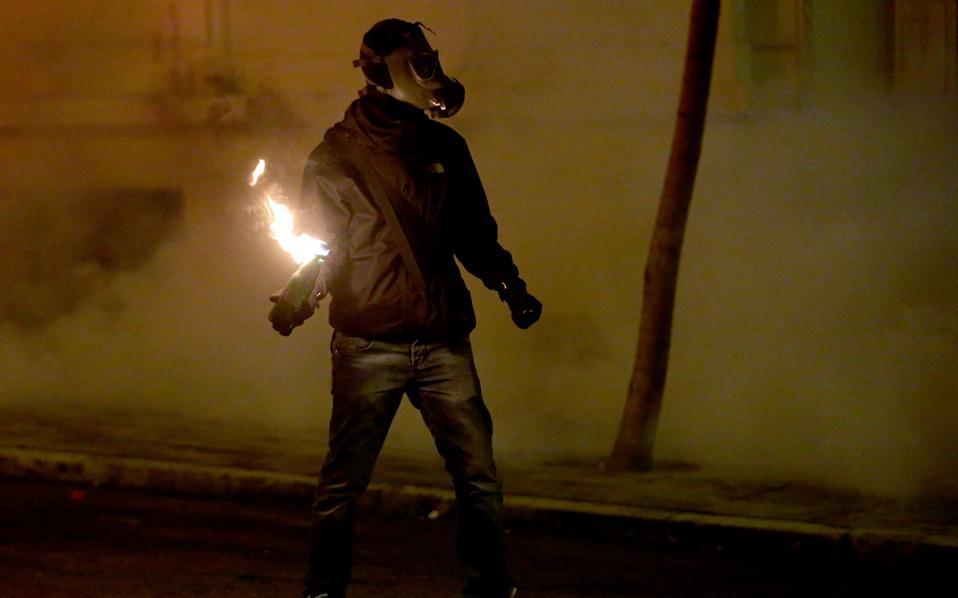A family business goes up in smoke

For most passers-by it was just another small neighborhood boutique. For those in the know, it was one of Athens’s best-kept secrets, a place where you could get good-quality, handstitched clothes at affordable prices. For the residents of Exarchia, it was one of the neighborhood’s emblems, a small business that had supported an entire family for over 40 years, a place with a recognizable name, that of its proprietor Maria Theologou.
But the store’s history came to abrupt halt in the early hours of December 6.
“It’s all gone; it’s been completely destroyed,” Theologou tells Kathimerini. She still hasn’t come to terms with the loss. Why was this particular store targeted? It was shortly before 11 a.m. – too early for the downtown protests commemorating the killing of teenager Alexis Grigoropoulos by a police officer in 2008 – when unknown assailants threw a Molotov cocktail at the store, setting the Christmas decorations on fire.
“It took 40 minutes for the fire service to respond,” says Theologou. “The dispatcher said they couldn’t send anyone to the area without police backup. The fire truck showed up only after a riot police platoon did.” By then it was too late and the damage was done. Nothing short of a miracle spared the adjacent toy store and bakery, or the entrance to the apartment building where Theologou kept her store on the ground floor.
The store was actually called Telino, though few knew it as such as an awning tended to cover the sign. It was owned for years by Theologou’s father before she took over to make a living and raise her family. For decades, Theologou arranged her shop window with ensembles that she herself had made in the basement.
“An entire family lived thanks to the store,” she says. When she retired, her son took over as he’d been unemployed at the time. “I help him,” she says, briefly forgetting her tenses. “But now it’s over.”
Theologou cannot explain what happened. “What I see is that the state has no mechanism to protect our property. The aim was obviously to get us out of here; to get all of us who still stay in the center to go.”
More damage was wreaked in the wider area that weekend: Five cars were completely torched, dozens of signposts were torn down so their metal poles could be used to attack riot officers, and almost every bus stop on Panepistimiou Street, from Athens University to Omonia, was smashed.
The City of Athens cleanup crew was still looking for Exarchia Square’s public benches on the Tuesday after.
“They first went missing on Friday night, but we found four of the six a few hours later in the nearby streets. They’re used to set up roadblocks. We returned them to their place but they went missing again on Sunday morning,” says one of the workers.
The municipal workers had a tough job on their hands cleaning up after a protest rally during a general strike in downtown Athens on December 3, which had been followed by scuffles with police at a demo against US Secretary of State John Kerry’s visit to Athens the following day, and the Grigoropoulos rallies that weekend.
The first two days after the December 3 strike were spent cleaning up any trash or removable objects in the street that could be used in the following days as missiles – authorities were preparing for bigger clashes with self-styled anarchists at the weekend protest.
“We had cleared away all the garbage cans, 211 in total, and then had to pick up the trash from those locations as residents had nowhere else to throw it. We also cleared any construction material that was lying around and could have been used, so we didn’t suffer a lot of damage,” explains Vice Mayor for Sanitation Andreas Varelas.
In total, 12 recycling bins were torched in the area surrounding Exarchia, where authorities had not expected the riot to spread, and three in the center of the neighborhood that had not been taken away.
“The greatest damage was to the facades of buildings, to marble and tile finishes. Some were smashed entirely and I find it unlikely that those people will be compensated,” says Varelas.





